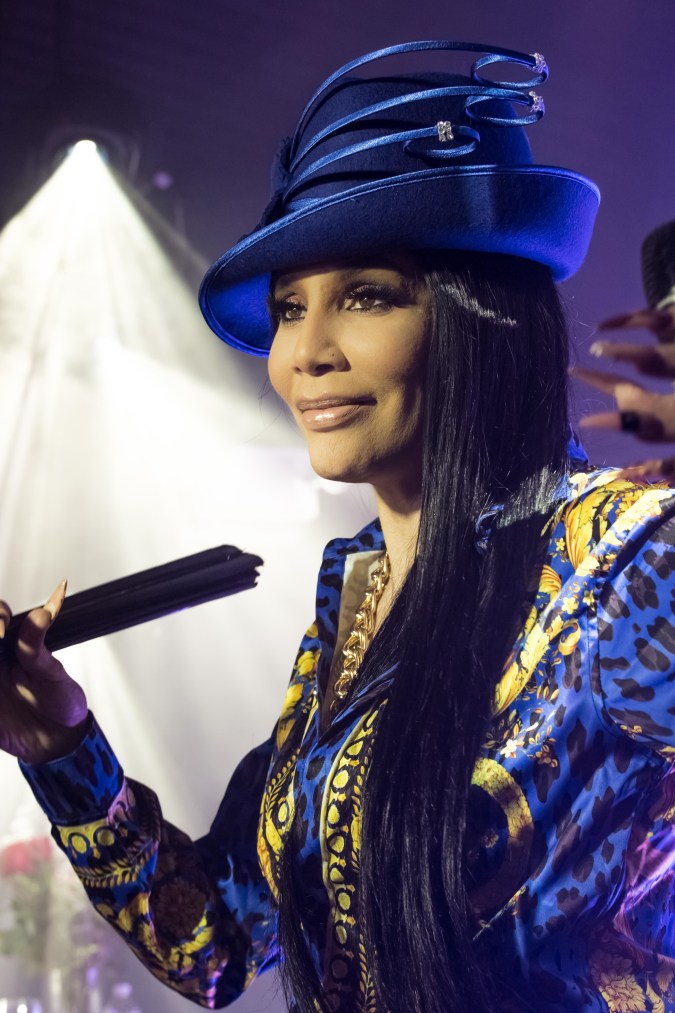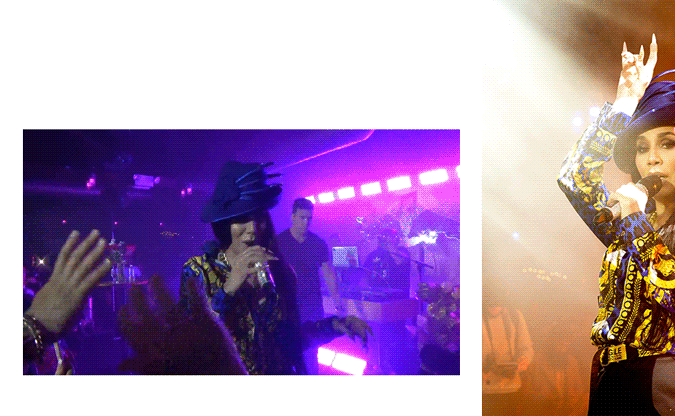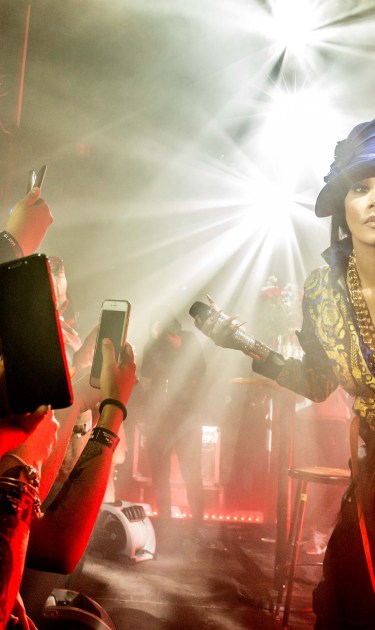On a crowded yacht rooftop, docked a few hundred yards away from New York’s La Marina nightclub, Ivy Queen gently grasps my hand with her ornately designed talons and says, “¿Vamos a bajar, no? Tengo frío, mami.”
An hour earlier, the high priestess of reggaeton stormed the stage at La Marina to perform hits from her 25-year career, in a Red Bull Music Festival throwdown celebrating The Noise, the genre-defining collective of rappers, DJs, and producers who became the architects of Puerto Rico’s reggaeton revolution. La Diva burst onstage in a royal blue Versace blouse and fascinator fit for the royal wedding, performing some of the more familiar reggaeton show antics – “¿Donde están las mujeres? ¿Los hombres?” – before showing love to the queer, intergenerational audience. “Is there any gay pride up in this bitch?” Twenty-five years since she got her start, it was clear the queen’s ineffable stage presence hadn’t changed one bit. Her charm, power, and commitment to upending gender normativity in reggaeton still resonates.

Later, back on the yacht, the reggaeton reina reflects on the colossal impact of her career, from her early days as a masterful lyricist in The Noise to her career-defining dancefloor consent anthem “Quiero Bailar.” From the tough-talk rhymes of early cuts like “Reggae Respect,” delivered in her familiar, husky-voiced rasps, to the mawkish bachatón balladry of “Te He Querido, Te He Llorado,” La Caballota influenced the flows, delivery, and vocal style of her male peers, tracing a blueprint for the genre while subverting its misogyny at the same time. In short, Ivy Queen snatched women’s pleasure out of reggaetoneros’ hands and served it to herself on a platter.
We sat down with Ivy to reflect on her legacy of empowerment, today’s reggaeton landscape, and her affection for Cardi B. Read the whole conversation below.
Editor’s note: This interview has been edited and condensed for clarity.

Today we’re celebrating The Noise. One of my favorite memories of that era was your hype battle with your husband Gran Omar during The Noise Live. Take me back to that moment. What was it like to be onstage for that experience, and what do you think was the impact of that battle for women in Puerto Rico?
The impact that I left in music – it was a hard one. I remember saying that I was in love with music and I asked for advice and people would say, “Oh you’re too short,” or “Oh, your voice makes you sound like a man,” like it was a curse. Looking back, you see, it was a gift; I put it to work. I’m a woman of substance; I like substance. I’m a lyricist and also a writer, so it was a big impact for many people because they were not prepared. Reggaeton was talking about women and asses, and I was talking about empowerment, so it was like, “Hey, who’s this woman?”
And speaking of that theme of empowerment, we’re coming up on the 15th anniversary of “Quiero Bailar” in August.
Oh shoot! To this day, people still sing it as if they were hearing it for the first time.
Tell me about those lyrics, especially that last line, “Y eso no quiere decir que pa’ la cama voy.”
You can dance; you can be free. It’s freedom, of course. I’m a very intense woman, and sometimes I feel like I’m not understood the way I should be. Thank god I have a marvelous husband, but I’m an intense woman. I say what I feel and sometimes people don’t like that; they prefer for you to tell them a white lie instead of telling them the truth. I wanted to bring something to women at that time, and to this time. I think I will do that until I die.

For the first time in a long time, there are a lot of women artists in reggaeton. What are your hopes for the next generation of artists? How would you want them to evolve your legacy as one of the genre’s pioneers?
I will always say that values begin at home. Your parents feed you your values, and when you go to the street you’re ready, you know how to protect yourself, you know what to do. I was raised by the streets. When I was a teenager, I was always in the streets. [The streets] were my mom and my dad. That’s what I mean when I say I’m an intense woman, because I’m a woman of substance, and I hope that my legacy is taken with the elegance of how I did it, how I have done it.
“Reggaeton was talking about women and asses, and I was talking about empowerment.”
Of course.
You have to empower women. The way I’m raising my daughter – she’s 4, I’m letting her be, but obviously, when it comes the time for me to instill those values and those seeds, I will protect her.
One of the artists I see following in your footsteps and evolving your legacy is Cardi B.
Ohh…my baby!
Tell me a little about your relationship with her. I know that you met each other last year for the first time.
I love the way she carries herself, because she says what she feels and she doesn’t give a fuck. And she’s being true to herself, she’s not being this fake [person] in a plastic box; she’s being herself, and that was Cardi’s success – people identify with what she says. When we met, I didn’t expect that reaction from her. She grabbed my hands, said I was her nail inspiration, and that she loves my song [“Quiero Bailar.”] She built something, you know what I mean? She changed her life! She transformed. That’s how you give the haters un tapaboca. I’m happy she turned herself into this beautiful mogul, you know? She don’t let these motherfuckers stop her and I love that about Cardi. I’m just waiting for the universe to conspire and let us go to the studio.

I was going to ask, do you have any plans to collaborate? I saw on Twitter she was talking about doing something with you. She wants to do a “Quiero Bailar” remix.
She wants to do “Quiero Bailar,” but I want to do so much stuff that we can do. We can do hip-hop, of course; we can do urban.
She did “La Modelo,” maybe you can do a dancehall track.
I love dancehall! Let’s see what happens, but I think the universe is speaking because I was not expecting Cardi to still give me that sort of love and respect. I love her.
This interview was conducted in Spanglish by Isabelia Herrera and translated by Marcos Hassan for Remezcla.




